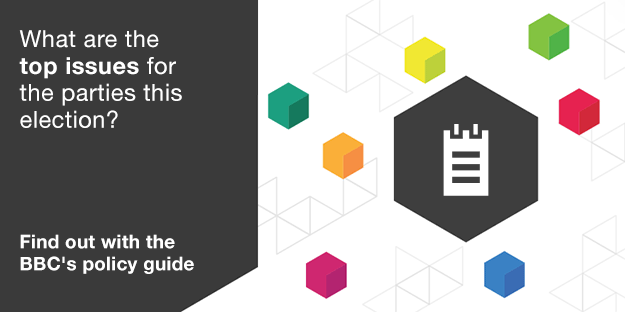Can Labour still dominate in Wales?
- Published
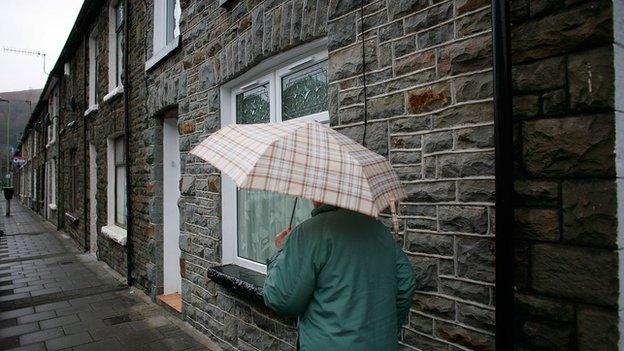
The Rhondda Valley has experienced hard times
The campaign trail through the Rhondda Valley is a rather muddy, squelchy one.
I'm with the leader of Plaid Cymru, Leanne Wood, crossing the fields beneath a mountain on our way to what is described as a portal - I don't expect a shimmery sci-fi gateway but am slightly disappointed when there's not even a hole in the hillside.
Instead, a manhole cover in the ground.
It marks the start of the Rhondda and Swansea Bay Railway Tunnel, external closed in the 1960s, one of the many victims of Dr Beeching's infamous cuts, external.
The party leader listens to the enthusiasts here who have high hopes of reopening it , externalas the second longest cycle tunnel in the world, but she wisely declines to go under ground, thus avoiding any attempt to get through a 20in hole.
Leanne Wood is sometimes accused of a lack of charisma, but she is assured, fluent and natural with none of the artificial glibness that can come so easily to senior politicians.
However, her party is hardly rocketing ahead in the polls.
They are predicting gains - but most observers think they'll be lucky to hold on to all three current seats.
Catching up Scotland
Plaid Cymru means the Party of Wales, but that is an aspiration, a job application, rather than a political fact.
If they were doing as well here as the polls indicate the SNP are in Scotland, Labour would be finished as a UK party.
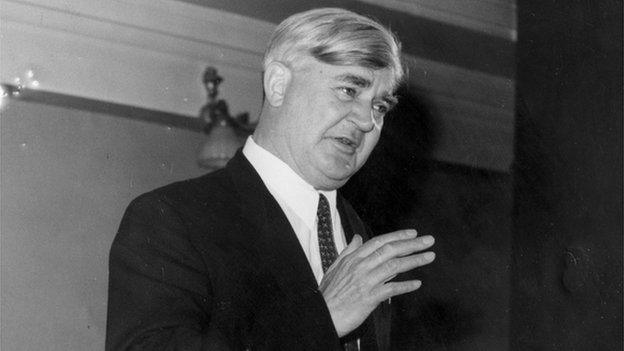
Aneurin Bevan: An important Labour figure from Wales
I put it to Leanne Wood that they are hardly going to wipe Labour out in Wales.
"Its unlikely," she said. "But I think we will do well.
"We are hoping that Plaid Cymru will have its best ever general election result.
"We are a different country and a different party to the SNP, and on different stages of our devolution journey, but I am confident that Wales will catch up with Scotland and PC will catch up with the SNP in time."
Lee Waters, the director of an independent think tank, the Institute of Welsh Affairs, says the valleys and the glens are divided by more than just a few hundred miles.
"It's often thought that Wales and Scotland are comparable and they really aren't at all. Certainly not politically.
"But I think the real difference is our wealth. Wales is poorer and support for independence is closely linked to that.
"People can see that were we to be independent we would have to cut public services by something like a fifth on the current economic performance.
"So that isn't a particularly appetising prospect for anybody."
Softened message
Mr Waters said Plaid Cymru had begun to soften its message as a result, suggesting full independence was a long-term aim.
But he said no party in Wales had set out a vision for how to close the significant economic gap between Wales and England.
"The Welsh GDP per head, our wealth per head is 72% of the UK average. It would take 20 years of growth at 4% a year to close that gap with England.
"Wales is one of the poorest parts of Europe: we're up there with Hungary and the accession countries. And that underlying weakness underlies all of the political debate."
Hence the search for something to put some modern economic flesh on the bones of heavy industry.
The plan to turn this old pit railway into a tourist attraction is scarcely unique: the rusty pit heads I've passed on my journey here have long ago swapped their queues of miners for a smaller stream of visitors, external.
Welsh politics, too, is redolent of history and heritage.

General election 2010:
Labour 26 seats (down four)
Conservative 8 (up five)
Lib Dems 3 (down one)
Plaid Cymru 3 (up one)

Wales is one of the birthplaces of the Labour party, and provided leading figures such as Aneurin Bevan, Michael Foot and Neil Kinnock.
Political tribalism is losing its grip, but if the rest of the UK was like Wales, Labour would have few worries in this election. The party has 26 MPs and may make further small gains.
But devolution has also provided the Conservatives with a potent charge that they are using on a UK level in this election.
They say the way Labour has run the Assembly - particularly cutting money to the health service and getting rid of targets in education - shows it isn't fit for government.
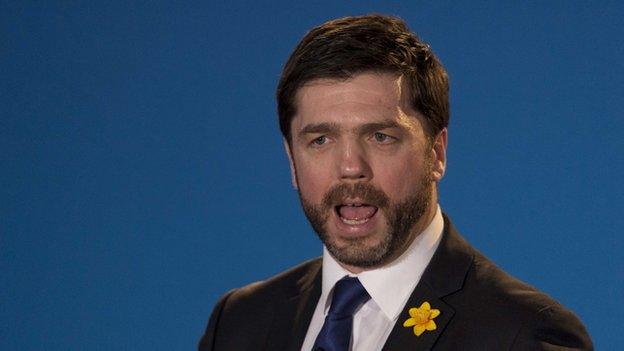
Stephen Crabb is Secretary of State for Wales
Stephen Crabb, David Cameron's Welsh Secretary, is a local boy made good. He was bought up in Pembrokeshire in a council house by his mum, a single parent.
"At the core of the election campaign is the economy.
"And in Wales, let's be clear about this, we are at the bottom of the economic league table of the UK and have some serious long-term challenges.
"Also coming up is health services, the quality of the NHS."
Welsh Tories have a fight to hold on to the eight seats they currently have. However, Wales now is very far from the Tory-free zone declared by Peter Hain in 1997.
He was Welsh Secretary under both Blair and Brown and is stepping down as Neath's MP at this election but says the Conservative charge is opportunistic and wrong.
"Things are not as good as they should be in the NHS in Wales or in England - but the idea that Wales under Labour is lagging far behind is nonsense and politically dishonest."
Cardiff canvassing
The election battle in Cardiff is particularly intense. In a street of large houses, some divided into flats, two teams of canvassers compete for attention.
On one street corner, a cluster of Lib Dem doorknockers gather around their clipboards discussing their next move.
Assembly Member Eluned Parrott says: "Here in Wales, Labour have been running the health service for 15 years.
"There are some of the longest wait times, some of the longest response times for ambulances and frankly bureaucratic chaos in some parts of the system which are preventing the staff doing the job they want to do, so things are more complicated here, more nuanced than the Labour Party UK-wide would want to admit."
As I talk to her, a team of young Labour canvassers on the same side of the street move determinedly from door to door.
I grab a quick word with one who tells me the issue raised on the doorstep is immigration.
If you think that is a bit of a strange answer, you need to know recent opinion polls suggest UKIP are doing well - way ahead of both the Lib Dems and Plaid Cymru.
Nathan Gill was the surprise of last year's Euro elections when he won Wales for UKIP.
"People at the fringes of what is going on, feel a need to have a drastic change in their lives and they will vote for a party that is offering a great deal of change, which is UKIP," he said.
No surge
The election in Wales is not expected to provide dramatic shifts.
But perhaps there is an important underlying story there.
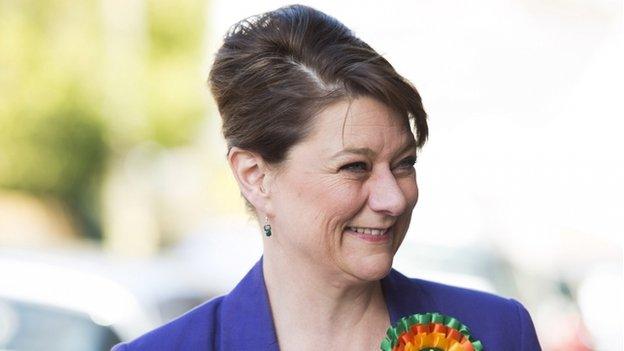
Leanne Wood hopes to make gains for Plaid Cymru
Prof Roger Scully, of Cardiff University, said Labour was doing very well in the polls two to three years ago, but that support has gradually ebbed away.
By the end of last year it was down to 36% - the same as at the last general election.
"Labour have now gone up to about 40% which is I suppose is now where they would hope to be, they may make some gains but they are not making great strides ahead."
This might mean Plaid has some power in a hung Parliament. If so, I ask Leanne Wood, if she would try to push Ed Miliband to the left?
"Yes. I think many people who vote Labour do so because of what Labour used to stand for in terms of their old values and if we with others can put pressure on Labour to consider what their regional values were all about then I think that is something that would have backing from people."
Labour is not under severe assault form the nationalists in Wales.
But in this poor, depressed heartland there is little sign of a surge in support for Mr Milband's party and Welsh nationalists might just matter for a minority government.
